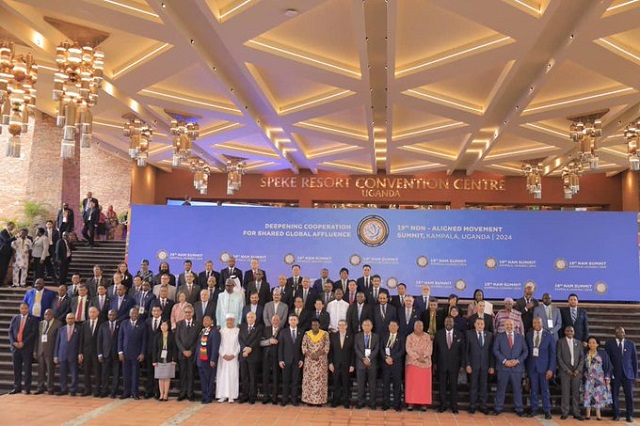Politics
Non-Aligned Movement Foreign Ministers Urge UN Respect For Sovereignty Amidst Global Challenges

Kampala, January 18, 2024 – Foreign Ministers participating in the ongoing Non-Aligned Movement (NAM) Summit in Kampala have called on the international community to uphold United Nations Resolutions, particularly those respecting the sovereignty of member-states. The ministerial summit, which began on Wednesday, follows the Senior Officials Preparatory Meeting and will be succeeded by the Heads of States Summit.
Attracting delegations from at least 90 countries, the summit is being hosted at the state-of-the-art Speke Resort Munyonyo in Kampala. State Minister for International Relations, Henry Okello Oryem, confirmed that 28 Heads of State have officially confirmed their attendance for the upcoming summit.
Key issues discussed during the ministerial summit included the conflict between Israel and Hamas in Palestine, interference by developed countries in the affairs of others, and the imperative need for reforms at the United Nations. The concerns raised underscored the global challenges faced by the international community.
During the opening remarks, Uganda’s Vice President Jessica Alupo emphasized the multiple challenges facing the world, citing conflicts such as Russia/Ukraine and the Palestine-Hamas crisis, which impact human lives and global resources essential for human development.
Netumbo Nandi-Ndaitwah, Deputy Prime Minister and Foreign Affairs Minister of Namibia, highlighted the necessity for UN reforms, addressing challenges that remain unresolved due to the current structure’s limitations. She specifically called for increased participation of women in UN-led policies and activities, along with an expansion of the UN Security Council.
Ndaitwah referred to the Israeli incursion in Gaza as a systematic “ethnic cleansing military operation” and urged UN member-states to observe the right to decolonization for all countries. She called on Israel to address the humanitarian situation and cease actions leading to the creation of millions of refugees.
South Africa’s Minister for International Relations and Cooperation, Naledi Pandor, emphasized the risks posed by multiple challenges, especially to the developing world, jeopardizing progress in recent years, including human rights. Pandor urged the summit to uphold the Bandung Principles, emphasizing respect for the UN Charter on Human Rights, territorial integrity, and peaceful dispute resolution.
Addressing the situation in Gaza, Pandor justified South Africa’s petition to the International Court of Justice for sanctions against Israel. She called for the release of Israeli hostages by Hamas, the cessation of what she termed the “genocide of unprecedented proportions” by Israel, and advocated for the establishment of two states for Israel and Palestine along the 1967 borders.
South Africa also pushed for “global governance reforms,” primarily targeting the United Nations. Pandor called for the expansion of the UN Security Council to include permanent members from Africa, Latin America, and Asia, criticizing the “selective application” of international laws by some Western powers.
The ministerial summit commenced with the election of the chairperson, with Foreign Affairs Minister Jeje Odongo unanimously elected. Odongo pledged that Uganda’s chairmanship for the next three years would focus on strengthening NAM, making it a more relevant body in today’s global context, while reiterating the enduring resonance of the principles upon which it was founded.


